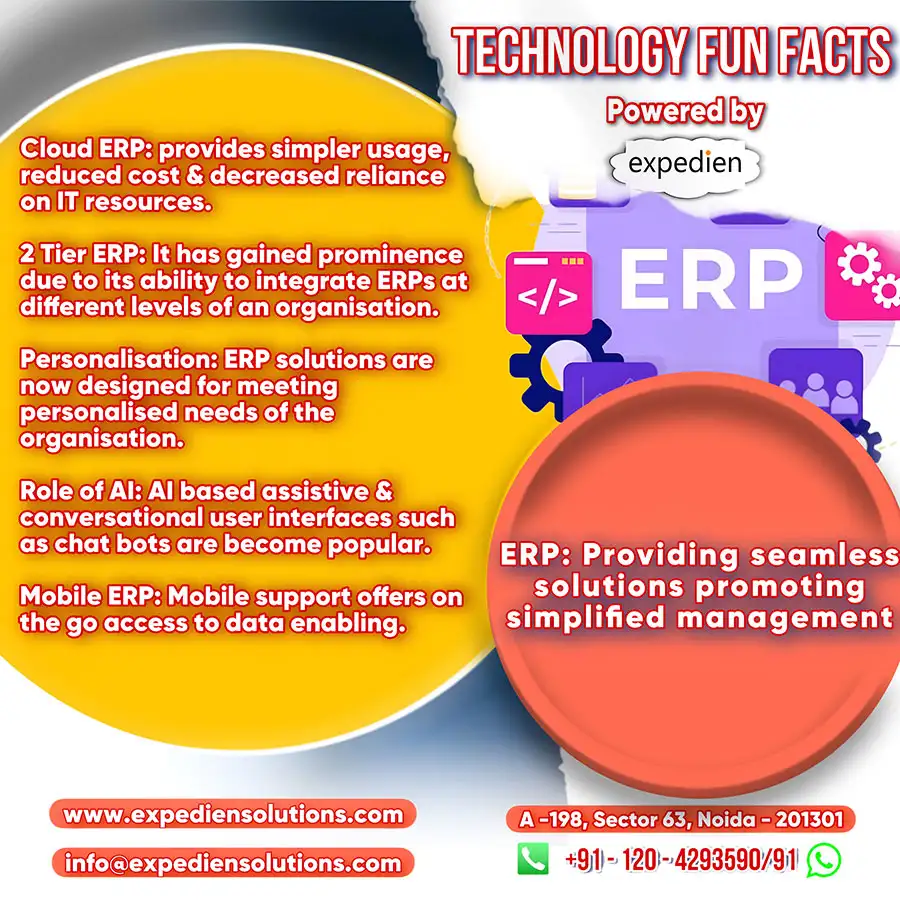- Home
- About Us
- Products
- Solutions
-

- Solutions by Industry
- Overview
-
- Solutions by Business Function
- Finance and Accounting
- Human Resource Management
- Purchase Management
- Operations Management
- Asset & Inventory Management
- Knowledge Management
- CRM - Customer Service, Call Center & Sales Automation
- Security & Surveillance
- BI and Data Warehousing
- Geo-Spatial Services & Solutions
- GIS based Turnkey Solutions
- Surveys
-
- Microsoft Dynamics Business Solution
- Overview
- Our Offerings
- Product Capabilities
- Industry Specific
-
- Services
- Clients
- Contact Us
ERP Systems, The game changing Innovation: Providing seamless solutions promoting simplified management
21 July | Expedien
Enterprise resource planning (ERP) solutions have matured and expanded their reach to support most functions that an organisation performs. They range from back-end processes like accounting & HR to front-office functions such as sales force automation (SFA), marketing automation and e-commerce. Organisations rely on ERP to not only cut costs by eliminating redundant processes and automating mundane tasks but it also provides employees access to critical information to make better decisions in less time consuming way.
The ever-evolving nature of these systems reflect their adaptability to incorporate new technologies and support a broader range of functions making ERP the most seamless way for running businesses today.

ERP Trends:
Cloud ERP: Previously many organizations were apprehensive about trusting business applications based on the cloud. However, the adoption of cloud ERP has gained momentum due to its simpler usage, reduced costs, decreased reliance on internal IT resources, and scalability to accommodate business growth.
Two-Tier ERP: Over the last decade many companies attempted to use a single ERP system for both headquarters and their regional offices with subsidiaries but this approach was expensive and challenging to implement as the subsidiaries often required specialized functionalities. The two-tier ERP approach has gained prominence as a more effective solution, it allows organizations to utilize their existing ERP system at the corporate level (tier 1) while subsidiaries and divisions operate with a different ERP solution (tier 2). This customized approach ensures improved administration and successful integration between the 2 tiers.
Personalization: Organizations can now take advantage of cloud ERP platforms designed for easier configuration and personalisation. There’s also a growing range of ERP solutions tailored to meet the needs of specific industries.
Role of AI: AI-based assistive and conversational user interfaces such as chat-bots are becoming increasingly popular. These interfaces interpret user text input and respond with relevant information stored within the ERP system. AI and machine learning capabilities embedded in ERP systems enhance personalization and optimize various business processes. AI's ability to spot patterns and conduct predictive analyses allows organizations to derive valuable insights from vast amounts of operational and user data.
Mobile ERP: Mobile support has become a norm for ERP providers with mobile apps offering on-the-go access to data. This enables employees to perform both back-end and front-end tasks regardless of their location promoting collaboration among users placed in different time zones.
Key Takeaways:
Organisations are increasingly adopting cloud ERP solutions with the global market projected to grow by 13.6% annually, reaching $40.5 billion by 2025 as per statistics.
Artificial intelligence (AI), particularly machine learning plays a significant role in optimizing business processes and provides insights for personalized customer interactions.
Related Blogs
Stay informed
Subscribe to Expedien's Tech Digest blog


